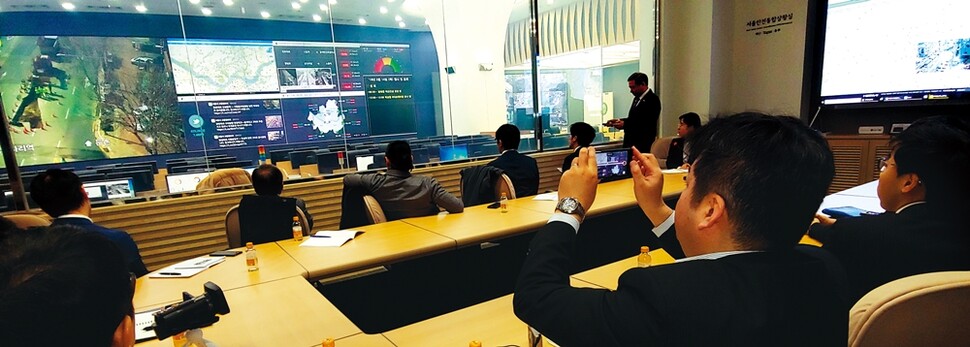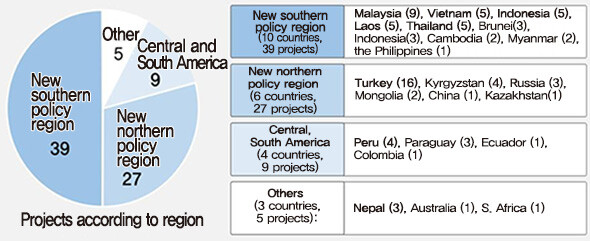hankyoreh
Links to other country sites 다른 나라 사이트 링크
23 countries request aid in adopting South Korean “smart city” model

The governments of 23 countries have submitted requests in an international effort to promote adoption of the South Korean “smart city” model. The Ministry of Land, Infrastructure and Transport (MOLIT) announced on Apr. 1 that government and public institutions in 23 countries had submitted a total of 80 requests for the “K-City Network” support program for Korea’s smart city technology.

A total of 31 submissions for smart city technology support for urban development were made by 17 countries, including Indonesia, Myanmar, and the Philippines in the category of “new city” development; Australia and India in the category of railway station area development; Russia and Turkey in the category of industrial complex development; Laos in the category of smart city development road map formulation; and Peru in the category of airport relocation site development. Nineteen countries were involved in 46 individual projects including the adoption of AI-based transportation systems, e-government and data center establishment, water and sewage management, and waste disposal.
First proposed at the Korea-ASEAN Smart City Ministerial Meeting in Busan last November, the K-City Network is being viewed by MOLIT as a means of cooperation not only with ASEAN but also with countries comprising South Korea’s “new northern” policy (China and Central Asia), as well as Central and South America. MOLIT plans to collect feedback from ministries that work with overseas government offices on areas such as current intergovernmental cooperation, project prospects, and the potential for collaboration with South Korean businesses. MOLIT will then hold a meeting of an assessment committee consisting of internal and outside experts before making a selection on Apr. 20 of around 10 countries to receive support.
“These requests showed that overseas demand for the South Korean smart city model is very high,” said Lee Sang-ju, who heads MOLIT’s urban policy division.
“We plan to share the submitted projects not just with the related railway, road, and airport offices within the ministry but at the pan-government level and take advantage actively on this opportunity for South Korean smart city exportation,” Lee said.
By Kim Tae-gyu, staff reporter
Please direct comments or questions to [english@hani.co.kr]

Editorial・opinion
![[Column] Park Geun-hye déjà vu in Yoon Suk-yeol [Column] Park Geun-hye déjà vu in Yoon Suk-yeol](https://flexible.img.hani.co.kr/flexible/normal/500/300/imgdb/original/2024/0424/651713945113788.jpg) [Column] Park Geun-hye déjà vu in Yoon Suk-yeol
[Column] Park Geun-hye déjà vu in Yoon Suk-yeol![[Editorial] New weight of N. Korea’s nuclear threats makes dialogue all the more urgent [Editorial] New weight of N. Korea’s nuclear threats makes dialogue all the more urgent](https://flexible.img.hani.co.kr/flexible/normal/500/300/imgdb/original/2024/0424/7317139454662664.jpg) [Editorial] New weight of N. Korea’s nuclear threats makes dialogue all the more urgent
[Editorial] New weight of N. Korea’s nuclear threats makes dialogue all the more urgent- [Guest essay] The real reason Korea’s new right wants to dub Rhee a founding father
- [Column] ‘Choson’: Is it time we start referring to N. Korea in its own terms?
- [Editorial] Japan’s rewriting of history with Korea has gone too far
- [Column] The president’s questionable capacity for dialogue
- [Column] Are chaebol firms just pizza pies for families to divvy up as they please?
- [Column] Has Korea, too, crossed the Rubicon on China?
- [Correspondent’s column] In Japan’s alliance with US, echoes of its past alliances with UK
- [Editorial] Does Yoon think the Korean public is wrong?
Most viewed articles
- 1‘We must say no’: Seoul defense chief on Korean, USFK involvement in hypothetical Taiwan crisis
- 2Will NewJeans end up collateral damage in internal feud at K-pop juggernaut Hybe?
- 3[Column] Park Geun-hye déjà vu in Yoon Suk-yeol
- 4Why Korea shouldn’t welcome Japan’s newly beefed up defense cooperation with US
- 5Thursday to mark start of resignations by senior doctors amid standoff with government
- 6N. Korean hackers breached 10 defense contractors in South for months, police say
- 7[Guest essay] The real reason Korea’s new right wants to dub Rhee a founding father
- 8[Column] ‘Choson’: Is it time we start referring to N. Korea in its own terms?
- 9Kim Jong-un expressed ‘satisfaction’ with nuclear counterstrike drill directed at South
- 10[Editorial] New weight of N. Korea’s nuclear threats makes dialogue all the more urgent